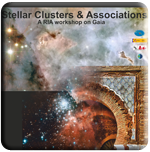Hierarchical Bayesian approach for estimating physical properties in nearby galaxies: Age Maps (Paper II)
Sánchez-Gil, M. Carmen; Alfaro, Emilio J.; Cerviño, Miguel; Pérez, Enrique; Bland-Hawthorn, Joss; Jones, Heath
Monthly Notices of the Royal Astronomical Society, Volume 483, Issue 2, p.2641-2670 (2019).
02/2019
ABSTRACT
One of the fundamental goals of modern astrophysics is to estimate the physical parameters of galaxies. We present a hierarchical Bayesian model to compute age maps from images in the H α line (taken with Taurus tunable filter, TTF), ultraviolet band (GALEX far UV, FUV), and infrared bands (Spitzer 24, 70, and 160 μm). We present the burst ages for young stellar populations in a sample of nearby and nearly face-on galaxies. The H α to FUV flux ratio is a good relative indicator of the very recent star formation history (SFH). As a nascent star-forming region evolves, the H α line emission declines earlier than the UV continuum, leading to a decrease in the H α/FUV ratio. Using star-forming galaxy models, sampled with a probabilistic formalism, and allowing for a variable fraction of ionizing photons in the clusters, we obtain the corresponding theoretical ratio H α/FUV to compare with our observed flux ratios, and thus to estimate the ages of the observed regions. We take into account the mean uncertainties and the interrelationships between parameters when computing H α/FUV. We propose a Bayesian hierarchical model where a joint probability distribution is defined to determine the parameters (age, metallicity, IMF) from the observed data (the observed flux ratios H α/FUV). The joint distribution of the parameters is described through independent and identically distributed (i.i.d.) random variables generated through MCMC (Markov Chain Monte Carlo) techniques.


